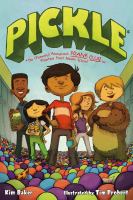
Gr 4-6-Ben Diaz has a secret. His after-school pickle-making club is just a cover for the group's real purpose: pulling pranks. Ben also has a problem. His best friend wants to join, but Hector can't keep a secret, and Hector's grandmother is the stern principal of the boys' middle school. When a prank releases thousands of crickets at a school fair, the principal suspends all extracurricular activities until the culprits turn themselves in. The club members organize a protest to reclaim students' rights, as Ben says, "to be responsible for our choices. We can't if she won't let us." The resolution will satisfy even if it's a bit idealized, just as the novel's kid-empowerment theme will resonate with young readers, but it does not help them to consider that their choices-like pranks-can have unintended consequences. Ben's first-person narration feels authentic. What feels forced is the device of the protagonist warning readers in chapter one to continue with the story "only if you think you can handle it." The club members all have backstories that make them distinct characters; the adults get less attention. Probert's finely detailed, expressive illustrations depict the club's racially diverse makeup. Baker's debut novel shows promise and offers an enjoyable read.-M. Kozikowski, Sachem Public Library, Holbrook, NY (c) Copyright 2012. Library Journals LLC, a wholly owned subsidiary of Media Source, Inc. No redistribution permitted.
What new kid at school hasn't dreamed about making friends, being part of a club, and even perhaps playing a prank and not getting caught? Sixth-grader Ben Diaz wants to expand his circle of friends, and he thinks starting the year with a prank is a good way to do it. However, he is not going to include Hector in the prank. Why not? It just so happens that Hector's grandmother is the principal of their middle school (and she has no sense of humor). After succeeding with his initial prank, Ben decides to form a school club, the League of Pickle Makers, to use as a guise for their pranks. As the pranks escalate, readers will know that the culprits will eventually get caught. Even though this is a fast-paced, humorous story, it tackles the true meanings of friendship. Meanwhile, Probert's illustrations offer just the right amount of characterization. Pair this with James Preller's Justin Fisher books or Jeff Kinney's Diary of a Wimpy Kid series.--Petty, J. B. Copyright 2010 Booklist
Baker's debut is a lighthearted romp with cross-gender appeal. When good- natured sixth-grader Ben Diaz stumbles on the chance to pull a perfect, anonymous prank at school (the balls from a pizzeria's ball pit are involved), the satisfaction-and his schoolmates' reaction-inspire him to seek out bigger opportunities. He recruits two classmates for his "secret prank task team"; they are soon joined by two more, creating a multicultural and personable crew of mischief-makers. Together they go undercover as the most boring official school club they can think of, the League of Pickle Makers. Soon the school fountain is overflowing with soap bubbles, and kids in soaked clothing are emerging from the restrooms (where the sinks have been wrapped in plastic), thanks to Ben's Prank and Trick Association (the other P.T.A.), which must also keep up its pickle-making cover for an upcoming Pioneer Fair. Fair warning: the practical jokes are troublesome and annoying to authority figures but harmless and hilarious to kids, and thus may prove inspirational to like-minded readers. Ages 8-12. Agent: Sara Crowe, Harvey Klinger Inc. (Sept.) (c) Copyright PWxyz, LLC. All rights reserved.
Gr 4-6-Ben Diaz has a secret. His after-school pickle-making club is just a cover for the group's real purpose: pulling pranks. Ben also has a problem. His best friend wants to join, but Hector can't keep a secret, and Hector's grandmother is the stern principal of the boys' middle school. When a prank releases thousands of crickets at a school fair, the principal suspends all extracurricular activities until the culprits turn themselves in. The club members organize a protest to reclaim students' rights, as Ben says, "to be responsible for our choices. We can't if she won't let us." The resolution will satisfy even if it's a bit idealized, just as the novel's kid-empowerment theme will resonate with young readers, but it does not help them to consider that their choices-like pranks-can have unintended consequences. Ben's first-person narration feels authentic. What feels forced is the device of the protagonist warning readers in chapter one to continue with the story "only if you think you can handle it." The club members all have backstories that make them distinct characters; the adults get less attention. Probert's finely detailed, expressive illustrations depict the club's racially diverse makeup. Baker's debut novel shows promise and offers an enjoyable read.-M. Kozikowski, Sachem Public Library, Holbrook, NY (c) Copyright 2012. Library Journals LLC, a wholly owned subsidiary of Media Source, Inc. No redistribution permitted.


